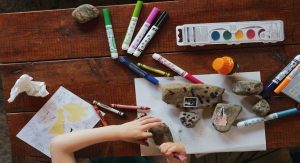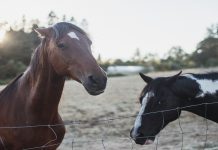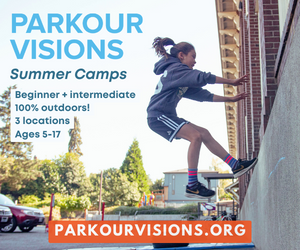I know, I know. I can already hear the cries of protest that our kids need a break after the year that has felt like twelve years in one. But hear me out. My first grader came home on the last day of school, sad about missing her friends and her teacher, and proclaimed, “Well at least I won’t have to learn anything for a while.” Cue my immediate feelings of failure as a mother and teacher, and I can’t help but wonder: how many other children believe that learning is confined to a school building?
 I think we all hope for our kids to become lifelong, empathetic learners and critical thinkers. Unfortunately, the joy of discovery and learning through play often starts fading too early. My daughter’s comment made me realize that kids often compartmentalize and don’t see that learning is happening all the time, in and outside the classroom. Because I’m able to be home during the summer, I want to put my teaching skills to use and be intentional about keeping learning fun this summer. I think I might have found a way that will work for us.
I think we all hope for our kids to become lifelong, empathetic learners and critical thinkers. Unfortunately, the joy of discovery and learning through play often starts fading too early. My daughter’s comment made me realize that kids often compartmentalize and don’t see that learning is happening all the time, in and outside the classroom. Because I’m able to be home during the summer, I want to put my teaching skills to use and be intentional about keeping learning fun this summer. I think I might have found a way that will work for us.
Gelato For The Win!
It started with a puzzle. Being the hip, middle-aged mom that I am, 1,000 piece puzzles are my jam. My most recent conquest was a montage of famous landmarks and cities around the world, and my children “helped” while asking questions about the pictures of the Eiffel Tower, the Great Wall of China, and Mayan temples. They were hooked, and an idea sprung.
I found a book for kids describing celebrations all over the world featuring art activities, interesting tidbits, and recipes. We started with Italy, mainly because my kids wanted an excuse to eat gelato, but we’ll roll with it. We found Italy on the map, we took a virtual tour of Florence, read about Italian holidays, wrote out lists of the activities we would do, and made noodles from scratch. They loved it. They want to learn about Mexico next, mostly for the arroz con leche, but I’m OK with their motivations. We are reading, writing, learning about the world, cooking, and using creativity for relatively little time and next to no money.
I may not be able to tell you the last time my kids took a bath since school ended, but our global project is something I feel relatively capable of maintaining. No matter what, there are small, fun ways to infuse learning into every day summer life, and I hope these ideas and suggestions I’ve rounded up give you some inspiration!
Keep It Interesting!
Read, read, and then read some more If I can make any suggestion, it would be to eliminate timers, reading logs, or anything else that sucks the joy out of literature. It doesn’t matter how you do it. There’s great evidence that speaks to the power of read-alouds and audiobooks. There are graphic novels, countless books for reluctant readers, and libraries full of options, but let it be something they choose. My oldest could read all day, whereas my pre-schooler only wants to read books that feature Avengers or farting, so we work with what we’ve got. After a trip to the library, we have what my children named “Lemonade-Snuggle-Book Parties.” We basically just read while drinking lemonade, but they are all about it, so find a ritual or practice that works for you.
Write for fun My son is learning how to write and loves to practice his letters in shaving cream, sprinkles, and on my freshly painted walls. My daughter hates writing, but we found that she adores making treasure maps and writing mystery clues for us to find hidden household items. I’ve never worked so hard to find a spatula. Writing can be a blast if we tap in to kids’ interests. The possibilities are endless – journals, pen-pals, writing a letter to a celebrity they admire, collaborating with you to write a story, sidewalk chalk, creating captions for hilarious pictures, re-imagining song lyrics, Mad-Libs and more. Have a teenager who wants a new phone? Maybe they have to craft a persuasive argument. Are kids ever too young to learn the value of writing to their senators? Tap into whatever it is they care about.

Math For a kid who claims she hates math, my daughter loves to keep score in Yahtzee and design her own stores with individually priced items where I have to buy back my own shaving cream. She wants to sell lemonade this summer, so she has to come up with a budget and figure out how many customers she needs to make a profit. Any budding entrepreneurs in your family? Capitalize on that! Baking, planning out trips, calculating the tips at a restaurant, dividing food into equal parts to share, figuring out how many chores need to be done before earning that elusive monster truck – math is everywhere!
Science I was the weird kid who used to assign myself science projects, which is actually how I got my first bee sting. Kids are naturally curious, so let’s keep it going! Pinterest has your back – with relatively few household items, there are hundreds of experiments that kids will marvel at and beg to do. Vinegar and baking soda is worth its weight in gold. The teacher in me is also thrilled at the opportunity to sneak in academic language and reinforce it regularly. Kids can describe to you what they predict is going to happen, what they observe, if their hypothesis was correct or not. One of the greatest predictors of academic success if vocabulary knowledge, so the more academic language we use on a regular basis, the better!
STEM Projects Hands down, the greatest activities my students enjoyed were the community building challenges that required communication and creative problem solving, so I’ve started bringing it home to my children. Can they work together and build a tower out of dried spaghetti noodles, tape, and a marshmallow? Can they recreate the setting of their book out of Legos? Maybe they have to design a video game and do a coding activity? Can they invent a plate that will help them dispose of their least favorite vegetable? What about the free virtual escape rooms for just about any grade level? Any chance for kids to think outside the box is a win.
Whether they are making art, music, hiking, or discussing their opinions on the latest LOL doll, kids are practicing academic skills. We can infuse it into every day summer life and change the narrative that learning has to wait until September!

















